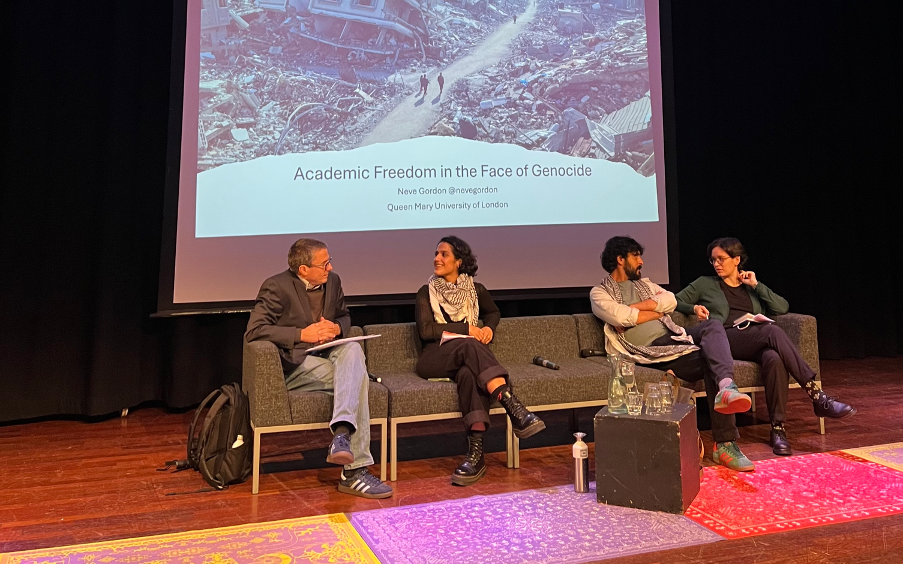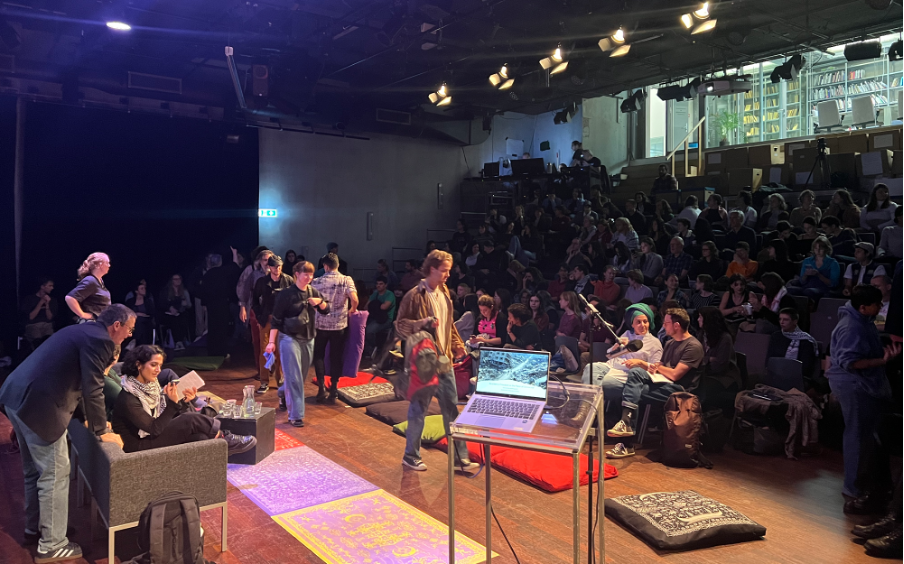Audience size limit
Pro-Palestinian lecture moved due to new UU rules

Held on September 24, the lecture was organised by Dutch Scholars for Palestine (DSP). Since the meeting was about the conflict in Gaza, it had to adhere to the guidelines of Utrecht University regarding this type of meeting. UU does not allow the organisers to choose the place themselves, neither does it allow more than fifty spectators to be present.
These guidelines were established right before the current academic year started. They specifically concern political gatherings in the city centre, such as those about Gaza and Israel. They must now be registered in advance with the Campus & Facilities department or with Security and may only happen in places approved by Security. There is a limit of 40 to 50 participants, with mandatory pre-registration and access control on-site. Finally, a distinction is made between education-related events and political activities.
The measures followed the pro-Palestinian demonstrations that culminated in occupations in May. The university believes the guidelines are necessary to prevent further occupations and ensure that students and staff feel safe.
A similar meeting was held in the city centre in May when the restrictions were not yet in effect. Researcher Maya Wind spoke about the links between Israeli universities and military projects, which she believes are problematic. Like Gordon, she is Jewish and critical of Israeli politics. Her lecture was well attended and resulted in an enthusiastic discussion with the members of the Executive Board, who also attended. After the lecture, all attendees went home peacefully.
Communicating the measures
According to a university spokesperson, the guidelines were shared with deans and directors in August and emailed to the organisation on September 12, shortly after Utrecht in Solidarity with Palestine had submitted a request for a lecture with Gordon. “That's why the lecture was not cancelled by us,” says Iris Kruijen, spokesperson for the Executive Board. “The organisers chose to move the event to a different location because they did not want to restrict the audience to fifty people.”
The pro-Palestine organisation states that it only received a notification about the new conditions a few day before the lecture, so it had to look for a different venue when it became clear that more than fifty people would come. Hence the move to a place outside the university.

The audience just before the start of the lecture. Photo: Phine Hazelbag/DUB
Universities as businesses
The lecture attracted around 200 attendees. Neve Gordon, Professor of Human Rights and International Humanitarian Law at Queen Mary University, in London, identifies as an Israeli Jew and has been active in the Arab-Jewish peace movement. He is known for his critical views, including his call for an academic boycott of Israeli universities. Gordon was on tour at three Dutch universities last week. His lectures focused on the role of academic freedom in times of genocide, specifically addressing the situation in Israel and Gaza. He takes a pro-Palestinian stance.
In his lecture in Utrecht, Gordon criticised the increasing commercialisation of universities, which he said undermines academic freedom and the role of universities as critical institutions. “Universities are increasingly operating like businesses,” Gordon said. “Profit and market dynamics are given priority, while core values such as independent research and freedom of expression are pushed into the background.” As a result, he argues that universities avoid sensitive issues such as the Israeli-Palestinian conflict out of fear of reputational damage and loss of funding.
Ironic
The Q&A session after the lecture was attended by UU lecturers Layal Ftouni and Alessandra Spadaro, UvA lecturers Annelies Moors, as well as by researcher Faisal Hamadah and UU student Raha. Ftouni pointed out the irony of the situation: “A lecture on academic freedom is being restricted by measures that seem to restrict that very freedom. These rules were introduced ad hoc, and the way this is being done feels like censorship.” According to all speakers, the attendance limit “fits into a broader trend of universities avoiding sensitive topics.”
Student Raha was equally critical. “What we are seeing here is a university that increasingly wants to exercise control over protests. Protests are only allowed as long as the university does not feel uncomfortable. The Executive Board is bending the rules to their advantage, intending to silence us.” According to Raha, the university is trying to criminalize protests and suppress the pro-Palestinian movement.
Is academic freedom in danger?
They were also critical of how poorly the new measures were communicated. The University Council also wondered in a recent meeting whether the rules are a restriction to academic freedom and whether the mandatory pre-registration does not lead to students and lecturers being monitored.
According to the Executive Board, that's not the university's intention. UU President Anton Pijpers says that the measures simply implement the house rules. Rector Henk Kummeling adds: “If the meeting is about Gaza, we will map out the risks.” This way, the organisers can know at the pre-registration phase whether the visitors are from the university or from outside. “Academic freedom does not mean that you can get a room at any given moment.”